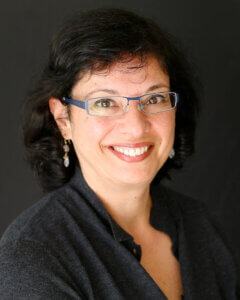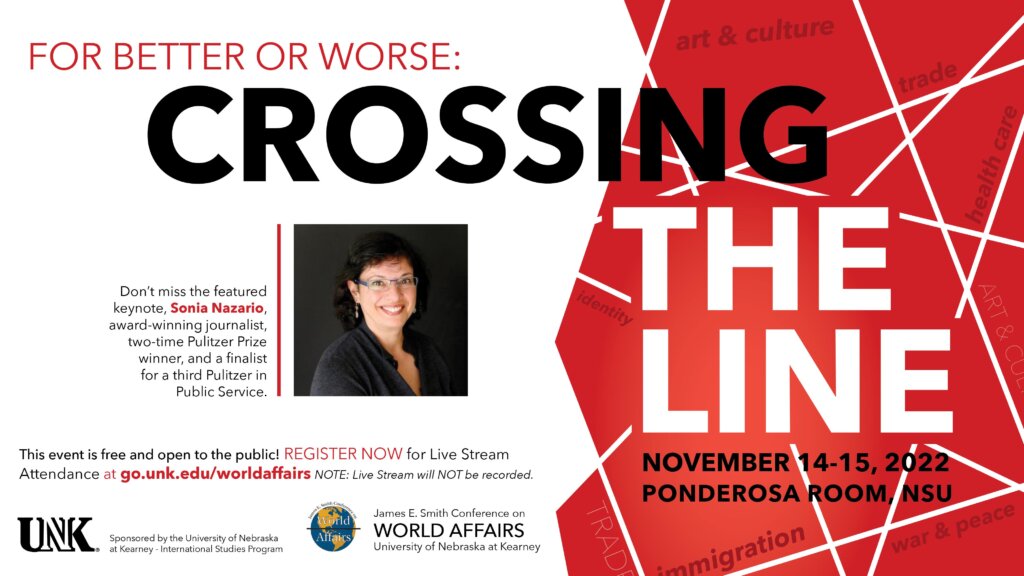By TODD GOTTULA
UNK Communications
KEARNEY – Hunger. Drug addiction. Immigration.
Award-winning journalist Sonia Nazario spent decades reporting and writing about those and other social issues for the Wall Street Journal, Los Angeles Times and other newspapers across the United States.

In November, she’ll visit the University of Nebraska at Kearney, where she is the keynote speaker for the Nov. 14-15 James E. Smith Conference on World Affairs.
Sponsored by UNK’s International Studies Program, the free public event is 9 a.m. to 5 p.m. and 7:30 to 8:30 p.m. Nov. 14 and 9:30 a.m. to 5 p.m. Nov. 15 at UNK’s Nebraskan Student Union, 1013 W. 27th St. Nazario will speak at 9 a.m. Nov. 14.
Attendees are asked to register at go.unk.edu/worldaffairs.
“For Better or Worse: Crossing the Line” is the title of this year’s conference, which was first held in 1964 and connects central Nebraska to global issues and exposes participants to a variety of viewpoints.
“This is an opportunity to become better acquainted with countries across our border and be inspired to visit them so that we may one day become a more united world,” said organizer Michelle Warren, director of international studies.
Many issues that shape the quality of our lives have an international dimension, she said.
“Global economic interdependence is now a reality that no nation can ignore. The development of appropriate environmental strategies, the resolution of regional conflicts and the enhancement of human rights all require a global perspective.”
Nazario will discuss the modern-day odyssey of many child migrants – some as young as 7, all of them traveling alone – who cross the line from Mexico in a quest to reunify with their mothers already living in the United States.
She is best known for “Enrique’s Journey,” her story of a Honduran boy’s struggle to find his mother in the U.S.
Published as a series in the Los Angeles Times, “Enrique’s Journey” won the Pulitzer Prize for feature writing in 2003. It was turned into a book that became a national bestseller.
Nazario, who grew up in Kansas and Argentina, has written extensively from Latin America and about Latinos in the U.S. In 2020, Parade Magazine named Nazario one of the “Most Influential Latin-American Women in History.”
In 1998, Nazario was a Pulitzer Prize finalist for a series on children of drug-addicted parents. In addition to serving on several boards that address socio-cultural issues, she currently is working on her second book and is a contributing opinion writer for the New York Times.
Nazario is among 21 speakers who will present at the conference. Additional featured speakers include:
- Margaret Jacobs, professor of history at the University of Nebraska-Lincoln and director of the Center for Great Plains Studies, will share her research on government policies that demanded Indigenous children be separated from their families and sent to distant boarding schools and other institutions.
- Moises Park is a Korean-Chilean American associate professor of Spanish at Baylor University currently researching Latin American literature, cinema and culture. Park will show how individuals with multiple ethno-religious and gender identities are constantly “crossing lines” in the realm of poetry, film and music.
James E. Smith Conference on World Affairs Speakers
- Chin-Sung Cheng, director general economic division, Taipei Economic and Cultural Office in Chicago
- Darja Ferlez, minister plenipotentiary and political counselor, Republic of Slovenia
- María Jesús Fernández García, trade commissioner, Trade Commission of Spain in Chicago
- Abel Gomez Gutierrez, professor, Universidad Autonoma de Nayarit
- Sue Henry, state coordinator title IC, Migrant Education Program
- Margaret Jacobs, professor of history at the University of Nebraska-Lincoln and director of the Center for Great Plains Studies
- Brett Mayfield, CEO, White River Health & Education
- Sergey Melnitchenko, photographer and founder, MYPH Collective, Photography School & Gallery
- Itandewi (Ita) Mendoza, ID&R state coordinator, Title 1 Part C Migrant Education Program
- Sonia Nazario, Pulitzer Prize-winning journalist and author
- Ziteife Obi, supervisor for resettlement services, Lutheran Family Services
- Moises Park, associate professor Spanish, Baylor University
- Vladimir Polách, Ph.D. faculty Czech studies, Palacký University in Olomouc Czech Republic
- Mahabir Pun, teacher, social entrepreneur and activist, Nepal
- Roberto Razeto, head of international affairs, IULM University of Milan
- Yolima Rey, educator and multidisciplinary researcher, United Arab Emirates
- Kael Welch-Sagheer, former education coordinator, Institute for Holocaust Education, Omaha
- Sophia Wilson, associate professor of political science, Southern Illinois University Edwardsville
“For Better or Worse: Crossing the Line”
The world we live in is filled with visible and invisible lines – directing us, connecting us and dividing us. We create them, negotiate them, erase them, replace them and, of course, cross them both accidentally and deliberately every day of our lives. We cross streets to visit our neighbors but sometimes also to confront them. We cross class, ethnic, religious, and gender lines in ways that expand and enrich our social fabric but sometimes also risking tearing it. We cross national lines to see the world and learn about new cultures, but also to conquer other civilizations, imposing our cultural values upon them. And meanwhile, nature itself ignores all our artificially imposed boundaries – storms, heat waves, fires, viruses, and species move and cross these lines at will – sometimes for better, sometimes for worse.
